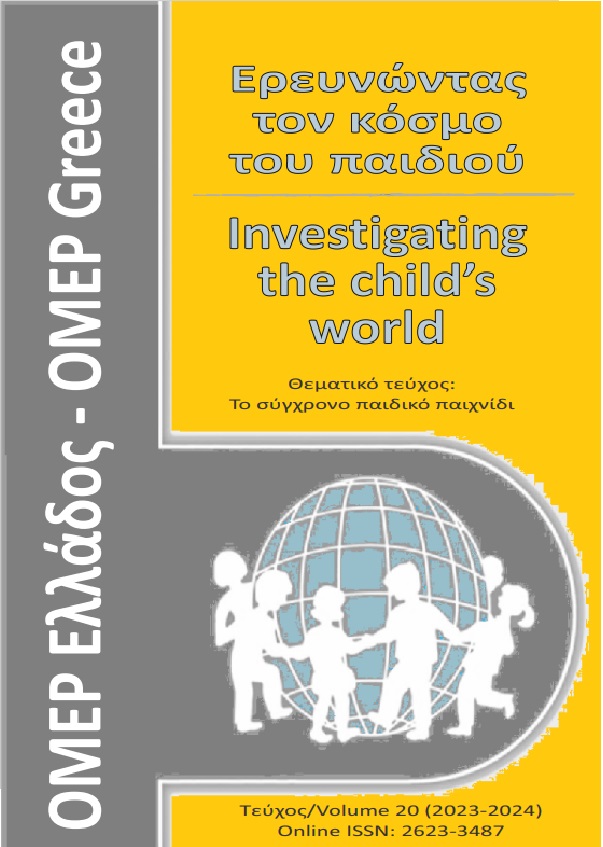Το Minecraft ως μέσο προώθησης δεξιοτήτων υπολογιστικής σκέψης στην προσχολική ηλικία: μια μελέτη περίπτωσης με δύο ομάδες νηπίων

Περίληψη
Η παρούσα εργασία εξετάζει αφενός την ανάδυση δεξιοτήτων Υπολογιστικής Σκέψης (ΥΣ) σε δραστηριότητες χωρίς και με υπολογιστή και αφετέρου το πως το ψηφιακό παιχνίδι Minecraft συνεισφέρει στην ανάδυση των δεξιοτήτων αυτών στο πλαίσιο της προσχολικής εκπαίδευσης. Οι δεξιότητες ΥΣ που εξετάζονται είναι: Αποσύνθεση, Χρονική Αλληλουχία, Αναγνώριση Μοτίβου και Αλγοριθμική Σκέψη. Στη μελέτη περίπτωσης που περιγράφεται συμμετείχαν συνολικά τέσσερα παιδιά προσχολικής ηλικίας. Η διδακτική παρέμβαση διήρκεσε μία εβδομάδα για κάθε δυάδα παιδιών και περιλάμβανε δύο δραστηριότητες χωρίς υπολογιστή (unplugged) και μία με υπολογιστή (plugged) στο Minecraft. Στην εργασία αυτή εξετάζονται πτυχές της δραστηριότητας με υπολογιστή όπου τα παιδιά αρχικά επεξεργάστηκαν το παραμύθι «Τα τρία μικρά λυκάκια» και στη συνέχεια κλήθηκαν να το αναδημιουργήσουν στο Minecraft. Τα αποτελέσματα έδειξαν ότι (α) αναδύθηκαν διαφορετικές δεξιότητες ΥΣ στα έργα χωρίς και με υπολογιστή και (β) το Minecraft παρείχε μοναδικές δυνατότητες που επέτρεψαν μια πολύ ανοικτή υλοποίηση των έργων. Η εργασία ολοκληρώνεται με μια συζήτηση των αποτελεσμάτων της έρευνας σε σχέση με την υφιστάμενη βιβλιογραφία.
Λεπτομέρειες άρθρου
- Πώς να δημιουργήσετε Αναφορές
-
Καρασαββίδης Η., & Φιδάνα Σ. (2024). Το Minecraft ως μέσο προώθησης δεξιοτήτων υπολογιστικής σκέψης στην προσχολική ηλικία: μια μελέτη περίπτωσης με δύο ομάδες νηπίων. Ερευνώντας τον κόσμο του παιδιού, 20, 173–190. https://doi.org/10.12681/icw.35537
- Ενότητα
- Επιστημονική αρθρογραφία & εκπαιδευτικές δράσεις

Αυτή η εργασία είναι αδειοδοτημένη υπό το CC Αναφορά Δημιουργού – Μη Εμπορική Χρήση 4.0.
Οι Συγγραφείς που δημοσιεύουν εργασίες τους σε αυτό το περιοδικό συμφωνούν στους παρακάτω όρους:
Οι Συγγραφείς διατηρούν τα Πνευματικά Δικαιώματα και χορηγούν στο περιοδικό το δικαίωμα της πρώτης δημοσίευσης ενώ ταυτόχρονα τα πνευματικά δικαιώματα της εργασίας προστατεύονται σύμφωνα με την Creative Commons Attribution License που επιτρέπει σε τρίτους - αποδέκτες της άδειας να χρησιμοποιούν την εργασία όπως θέλουν με την προϋπόθεση της διατήρησης των διατυπώσεων που προβλέπονται στην άδεια σχετικά με την αναφορά στον αρχικό δημιουργό και την αρχική δημοσίευση σε αυτό το περιοδικό.
Οι Συγγραφείς μπορούν να συνάπτουν ξεχωριστές, και πρόσθετες συμβάσεις και συμφωνίες για την μη αποκλειστική διανομή της εργασίας όπως δημοσιεύτηκε στο περιοδικό αυτό (π.χ. κατάθεση σε ένα ακαδημαϊκό καταθετήριο ή δημοσίευση σε ένα βιβλίο), με την προϋπόθεση της αναγνώρισης και την αναφοράς της πρώτης δημοσίευσης σε αυτό το περιοδικό.
Το περιοδικό επιτρέπει και ενθαρρύνει τους Συγγραφείς να καταθέτουν τις εργασίες τους μέσω διαδικτύου (π.χ. σε ένα ακαδημαϊκό καταθετήριο ή στους προσωπικές τους ιστοσελίδες) πριν και μετά από τις διαδικασίες της δημοσίευσης, καθώς αυτό μπορεί να οδηγήσει σε παραγωγική ανταλλαγή ιδεών και σκέψεων καθώς επίσης και σε γρηγορότερη και μεγαλύτερη χρήση και ευρετηρίαση της δημοσιευμένης εργασίας (See The Effect of Open Access).


